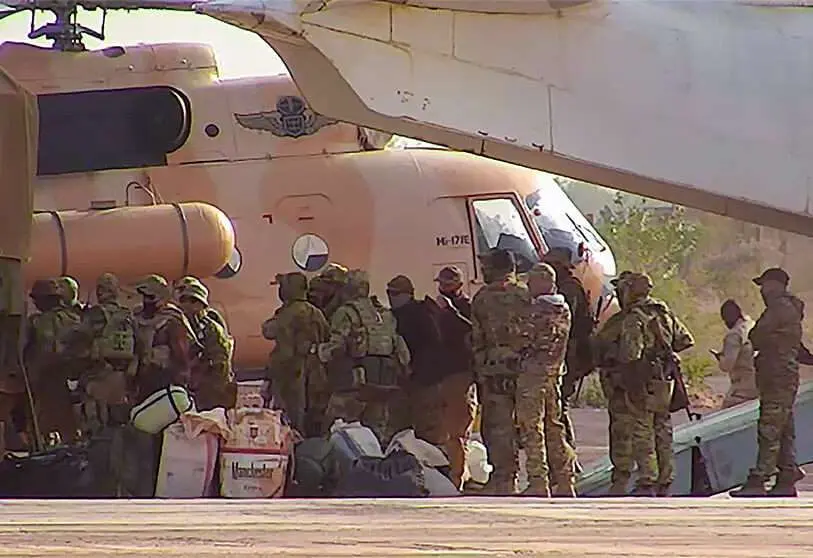Russia establishes a foothold in the Sahel through the Wagner group after the French pullout

While Russia continues its offensive in Ukraine, the mercenaries of the Kremlin-linked Wagner group persist in their goal of establishing themselves in several areas of Africa, including the Sahel, taking advantage of instability, growing anti-French sentiment and the vacuum left by European forces.
The Wagner group's tentacles began to expand in the Sahel in late 2021, when the organisation began operations in Mali with the approval of the military junta led by Assimi Goita, a Malian colonel who staged a coup d'état months earlier. In response to growing military cooperation between Bamako and Moscow, France opted to withdraw its troops in the African country, where they had been conducting counter-terrorism operations since 2013.
"We cannot cohabit with mercenaries," said the former French Armed Forces Minister after the Malian junta invited members of Wagner to help in the fight against jihadist organisations.

However, according to an ACLED report published in August 2022, Wagner's operations are also linked to several attacks against civilians in regions of the country such as Mopti, Segou, Timbuktu and Koulikoro, where the al-Qaeda-linked Support Group for Islam and Muslims (JNIM) has a significant presence. ACLED has recorded nearly 500 civilian deaths, including the massacre of hundreds of civilians in Mopti in late March 2022.
"Overall, 71% of Wagner's involvement in political violence in Mali has taken the form of violence against civilians," the report states. ACLED also implicates Wagner in the growing violence in the Central African Republic, where the Russian group has been present since 2018, following a military agreement between Bangui and Moscow.
As Rida Lyammouri, senior advisor for the Sahel and West Africa at the Policy Center for the New South (PCNS), a Morocco-based think tank, tells Atalayar, "Wagner's presence has increased the likelihood of abuses by Malian forces". Lyammouri explains that Wagner is "unlikely" to "discourage such behaviour against communities suspected and/or accused of collaborating with jihadists".

After Mali, the next country that seems likely to fall under Wagner's influence will be Burkina Faso, an African nation that during 2022 suffered two coups that have increased instability, not only within the country, but also in the region.
As in Mali, Burkina Faso's coup government led by Ibrahim Traoré asked France to withdraw its troops from the country. However, Traoré has claimed that his country still maintains diplomatic relations with Paris, unlike Mali, which expelled the French ambassador in January last year.
However, analysts warn that Burkina Faso will follow in its neighbour's footsteps and allow Wagner to enter the country. Indeed, there are rumours linking Moscow to the latest coup d'état in the country. In this regard, it is worth noting that Wager's founder, Yevgeny Prigozhin, was one of the first to support Traoré's seizure of power.

"We have also seen as a common element in these countries the presence of Russian flags in the demonstrations by the civilian population that prevent the French troops from redeploying", writes María del Pilar Rangel Rojas, an expert in international terrorism, in Atalayar.
The arrival of the Russian group not only has the approval of the coup governments in the Sahel, but also has the backing of a part of the population that rejects the French presence and brands it 'neo-colonial'. On the other hand, Wagner's arrival is seen as hope after French troops failed to contain jihadism.
"This is the result of months where Russia has been exploiting and generating, through social networks and some activists, anti-French sentiments", explains Rangel Rojas, who also points out that this hostility towards France has already spread from Mali to Burkina Faso and "will not take long to spread to other countries".

Lyammouri stresses that Russia's main objective is to "undermine the influence of France and the West in general in the region". Regarding the invasion of Ukraine, where Moscow has also sent a large number of Wagner fighters, Lyammouri stresses that if the war is prolonged "it could have an impact on the number of Wagner soldiers to be deployed in Mali and the region".
In addition to seeking a military presence in the region, Russia is seeking to establish itself as a major partner in a number of areas. Moscow not only hopes to strike military or defence deals with African countries, but also to profit from the continent's rich raw materials, such as gold, diamonds and uranium.

French withdrawal and the indifference of other Western countries pave the way for Russia's consolidation in the Sahel. According to Lyammouri, 'Europe, and France in particular, must review its strategy in the region to address diplomatic tensions and engage in a two-way dialogue on what is best for the African continent'. "The West should focus on Africa and not on what other world powers are doing in Africa," he concludes.
James Kariuki, the UK's deputy ambassador to the United Nations, has warned against this, noting "the destabilising role played by the Wagner group" in the Sahel. "They are part of the problem, not part of the solution," he said.
[ ?? RUSSIE | ?? MALI ]
— (Little) Think Tank (@L_ThinkTank) February 6, 2023
? Pour la toute première fois, un Ministre russe des Affaires Étrangères se rendra au Mali. Sergueï Lavrov est attendu demain à Bamako pour une visite d'amitié et de travail. pic.twitter.com/6ldzm1Gsqu
Against this backdrop and with the aim of further consolidating Russian influence in the area, Russian Foreign Minister Sergei Lavrov is to make a two-day visit to Mali. The trip, according to the Kremlin, "reflects a shared desire to strengthen defence and security ties", as reported by Reuters.
Bamako, for its part, notes that this high-level visit "is in line with the political choice made by the Transitional Government to expand and diversify strategic partnerships". Within this cooperation, the Malian military junta highlights the areas of defence and security.








